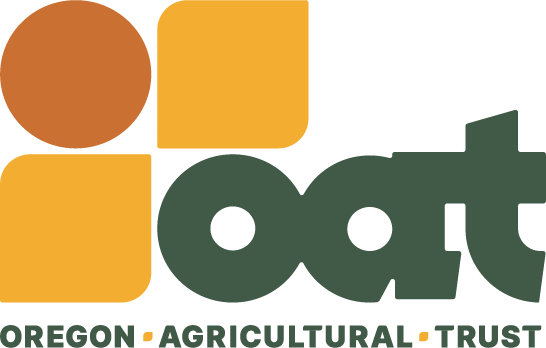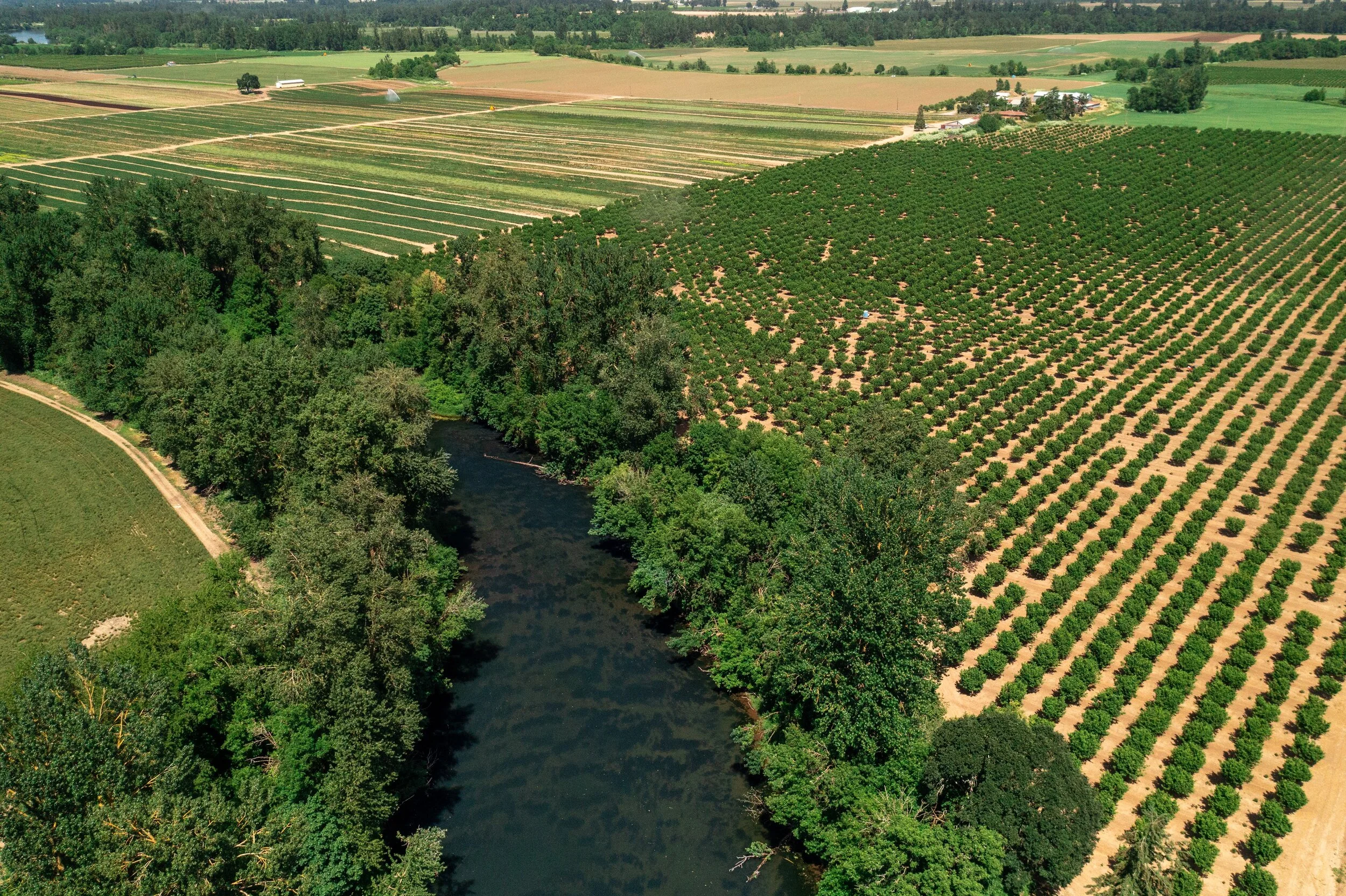OAT’s Communications Administrator, Cynthia Lopez sat down with OAT board member and General Manager of Wilson Cattle Company, Zach Wilson, to learn more about what it means to be a 6th generation rancher and how his family stewards the land. In this first installment, Zach talks about the education that’s been most valuable to him, from working on The Hill in DC to ranching in Hawai’i and New Zealand, to learning context about ranching decisions from his 90-year-old grandfather. In the second installment, Zach will share his views on how working land easements can be a win-win for both conservation and ranching. *
Cynthia Lopez: What is your current occupation and how did you get started?
Zach Wilson: I am the General Manager for Wilson Cattle Company which is a combination of several large ranches in Eastern Oregon and Washington. We also run a lot of cattle throughout the Pacific Northwest, California, and a little bit in Nevada. The progeny of our Cow Herd is marketed through the Country Natural Beef Co-op, which produces GAP-certified certified cattle. [GAP, or Good Agricultural Practices,] is a humane animal handling standard. The co-op supplies to Whole Foods, Burgerville, New Seasons Market, PCC markets, and some other smaller markets. We are also very alliance focused. We have alliances with several large western ranches where we provide oversight, financing, cattle care, and logistics, among other things, after calves are weaned at those ranches.
My family has been ranching in Oregon since 1887. Our ranch still has the original homestead ground where my family settled when we came across the Oregon Trail. I'm sixth generation.
I had a roundabout way of coming back to the family business. I graduated from the University of Oregon with a political science degree. The deal with coming back to the family business was that anyone who wanted to come back - whether it was me, my younger sister, my cousins, whomever - that there was always a door open… however, you first had to go work outside of the family business for five years, and then go get some sort of secondary degree.
So, with the political science degree I went to Washington DC and worked on Capitol Hill for a couple years. I also worked at a firm that ran online advertising during the 2012 and 2014 election cycles. After four or five years in DC, I was like, okay, this was fun. But I didn't want to be on the East Coast for the rest of my life. And so I decided that I was going to pursue secondary education.
Prior to that, when I left DC, I was sick of the urban lifestyle and wanted to travel a little bit, but I also wanted to gain experience while I traveled. So I went to work for one of our partners in Hawaii on the Big Island and worked there for three months. I was a ranch hand. We're branding cattle, moving cows, doing pasture rotations. I learned a lot. The ranchers in Hawaii are incredible, incredible grass managers. Being on a chain of islands, it's a pretty finite resource. It's not like the rest of the Western states where these ranches are big sprawling expanses. [In Hawaii], they're relatively small acreages, but they get a ton of production out of them.
When I was done there, we have a family friend who has a couple ranches - they call them stations - down in New Zealand. So I worked down there for three months. And down there, it's a little different. They not only run cattle, but they run sheep, and they raise red deer as well for the local New Zealand and German markets. I learned a lot about how to manage a multi-species operation and the symbiosis that goes along with doing that. When I was done with that, I came back to the states and got an MBA at the University of Denver.
CL: Wow, that is a whole lot of adventure.
ZW: I try and keep it interesting.
CL: Was there anything from working on Capitol Hill that you bring forward into your work now?
ZW: I think specifically to the Washington DC experience, you have to work with a lot of diverse personalities, a lot of diverse ways of thinking that don't always align with your own. But you work with these people and try to find consensus and a way to move forward. I think for the ranching industry, or the land use community, I'm able to apply a lot of those skills in terms of finding points of consensus, letting disagreements kind of roll off the back in view of what the larger goal is.
CL: Can you tell me more about your family’s history in Oregon?
ZW: We've been here a long darn time. And we're involved in all aspects of the supply chain. My Great-Great Grandparents raised horses for the US Military during World War 1. My Grandparents and my Great Aunt and Uncle began buying, improving, and selling, or retaining, ranches in the 50s and 60s. In 1991, my dad and his cousin started Beef Northwest Feeders. That started us with finishing cattle.
One unique aspect of our history was becoming members of the Country Natural Beef Coop. Members of the Coop retain ownership all the way through cattle life cycle to the meat shelf of the store. So our Cow-Calf operation isn't the traditional one where we will sell a calf off the cow or sell a stocker to a feed yard or from a feed yard sell to the processor. Because of our involvement in Country Natural Beef we are able to own that all the way through the supply chain and capture the value.
Our involvement with Country Natural Beef has allowed us to be involved with, and learn from, probably the most progressive-minded group of ranchers in the country. Whether that is animal handling and animal husbandry or whether it is marketing to a very stringent standard, it's allowed us to learn a ton.
I always like to say that our family history is a lot like building a house. Every generation adds an addition on to that house. It's my job to find what the next addition is.
CL: What made you decide you wanted to go into the family business?
ZW: I think it's probably something that in the back of my mind I thought I would always do. But I wanted to get a little outside experience and make sure that's what I wanted to do. The older I got, and the further away from it I got, the more I felt drawn back to it. For me, the appeal of ranching is that you’ve got to do a lot of jobs when you're ranching. It’s not just moving cattle from one place to another. You’ve got to know about the latest veterinary science, the latest laws and regulations. You need to know how financial systems work, whether that's due to an operating line with a bank, or your internal financials. Basically, it gives you the opportunity to learn about a wide variety of skills. Plus, you get to be in a gorgeous, gorgeous place. I mean, there's no better view than looking at the Elkhorns out of my office window.
CL: Given the variety, I know that you probably don't have a typical day, but could you tell me about an average day?
ZW: Right now it's a little slow because it’s winter. Ranching, like any natural resource industry, is pretty seasonal. In June, when we're really blowing and going, my typical day starts at 6:30am at our shop with my ranch crew. We have our morning meeting, talk about what we're going to do that day and get progress updates on any big projects for the week or the month. [We talk] about where water is - we flood irrigate our entire ranch. Talk to our cowboys about what they're seeing from a health perspective with the cattle that are on the property. That lasts anywhere from 30 minutes to an hour, depending on what's going on.
From there, I come to the office, check emails, do a typical office gig for a few hours. Then, mid-morning or noon, I like to take a spin around the ranch, see what's going on, check in with the guys again. I come back to the office and try to get some projects done, whether that's financial analysis or whether we're doing a project on operations.
At some point we're either receiving or shipping cattle. I like to go see what those cattle look like coming in or going out. I usually spend about an hour to an hour and a half talking with my ranch manager. Just getting on the same page with what we're both seeing.
At some point during the day, my 90-year-old grandfather will walk into my office and tell me everything he's seeing on the drive from his house at the opposite end of the ranch to his office.
CL: That's so great that you can touch in with him every day.
ZW: Well, it's great when everything's going well but when he sees stuff that's wrong, you know, it’s a different story! No, but I'm very lucky to be able to experience working with my 90-year-old grandfather.
CL: Is there anything in particular you’ve learned from your grandfather?
ZW: I have learned a lot through my own experience, but with [my grandfather], it's a lot of context. So I see things the way they are, but then he's able to say this is why it is, here's how we used to do it. Here's how we do it now. Which gives me a roadmap of how it evolved. What are the next two steps on this? So it's a history lesson. But that doesn't give it the credit it’s due. It’s really the context of why things are the way they are.
CL: That sounds really valuable.
ZW: Yes. I am incredibly grateful that both he and my grandmother are very much not “this is the way we've always done it, so this is the way it's going to be.” They're both very progressive minded, very open to new ideas, and very encouraging of improvement projects. So I got really lucky in the genetic lottery that way.
CL: Could you share your perspective on stewarding a multi-generational ranch?
ZW: Yes. It's a lot of responsibility. We have a wall here at the office that has the portraits of all the ancestors that have worked the land. So you look at that, and you feel the weight of the responsibility of that, but it's invigorating. I mean, I'm sixth generation. What do I need to do to set up the next six generations to be successful? A lot of blood and sweat equity went into this place. So what can we do to maintain it and then improve it? It’s being able to be involved with something that’s bigger than yourself.
CL: That sounds amazing to have all of the generations looking down on you.
ZW: Yes, I call it the wall ancestors.
*This conversation has been edited for length and clarity.




